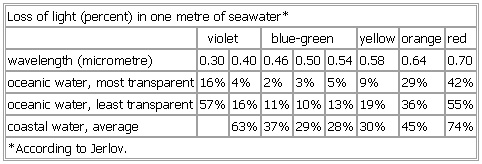Loss of light (percent) in one metre of seawater
- Loss of light (percent) in one metre of seawater
-
Loss of light (
percent) in one metre of seawater*
violet blue-green yellow orange red
wavelength (
micrometre) 0.30 0.40 0.46 0.50 0.54 0.58 0.64 0.70
oceanic water, most transparent 16% 4% 2% 3% 5% 9% 29% 42%
oceanic water, least transparent 57% 16% 11% 10% 13% 19% 36% 55%
coastal water, average 63% 37% 29% 28% 30% 45% 74%
*According to Jerlov.
See as table:
* * *
Universalium.
2010.
Look at other dictionaries:
Earth Sciences — ▪ 2009 Introduction Geology and Geochemistry The theme of the 33rd International Geological Congress, which was held in Norway in August 2008, was “Earth System Science: Foundation for Sustainable Development.” It was attended by nearly… … Universalium
hydrosphere — /huy dreuh sfear /, n. the water on or surrounding the surface of the globe, including the water of the oceans and the water in the atmosphere. [1885 90; HYDRO 1 + SPHERE] * * * Discontinuous layer of water at or near the Earth s surface. It… … Universalium
river — river1 riverless, adj. riverlike, adj. /riv euhr/, n. 1. a natural stream of water of fairly large size flowing in a definite course or channel or series of diverging and converging channels. 2. a similar stream of something other than water: a… … Universalium
wood — wood1 woodless, adj. /wood/, n. 1. the hard, fibrous substance composing most of the stem and branches of a tree or shrub, and lying beneath the bark; the xylem. 2. the trunks or main stems of trees as suitable for architectural and other… … Universalium
Wood — /wood/, n. 1. Grant, 1892 1942, U.S. painter. 2. Leonard, 1860 1927, U.S. military doctor and political administrator. * * * I Hard, fibrous material formed by the accumulation of secondary xylem produced by the vascular cambium. It is the… … Universalium
environment — environmental, adj. environmentally, adv. /en vuy reuhn meuhnt, vuy euhrn /, n. 1. the aggregate of surrounding things, conditions, or influences; surroundings; milieu. 2. Ecol. the air, water, minerals, organisms, and all other external factors… … Universalium
Antarctica — /ant ahrk ti keuh, ahr ti /, n. the continent surrounding the South Pole: almost entirely covered by an ice sheet. ab. 5,000,000 sq. mi. (12,950,000 sq. km). Also called Antarctic Continent. * * * Antarctica Introduction Antarctica Background:… … Universalium
hydrologic sciences — Introduction the fields of study concerned with the waters of the Earth. Included are the sciences of hydrology, oceanography, limnology, and glaciology. In its widest sense hydrology encompasses the study of the occurrence, the… … Universalium
plasma — plasmatic /plaz mat ik/, plasmic, adj. /plaz meuh/, n. 1. Anat., Physiol. the liquid part of blood or lymph, as distinguished from the suspended elements. 2. Cell Biol. cytoplasm. 3. whey. 4. a green, faintly translucent chalcedony. 5. Physics. a … Universalium
gastropod — /gas treuh pod /, n. 1. any mollusk of the class Gastropoda, comprising the snails, whelks, slugs, etc. adj. 2. Also, gastropodous /ga strop euh deuhs/. belonging or pertaining to the gastropods. [1820 30; < NL Gast(e)ropoda a class of mollusks.… … Universalium

